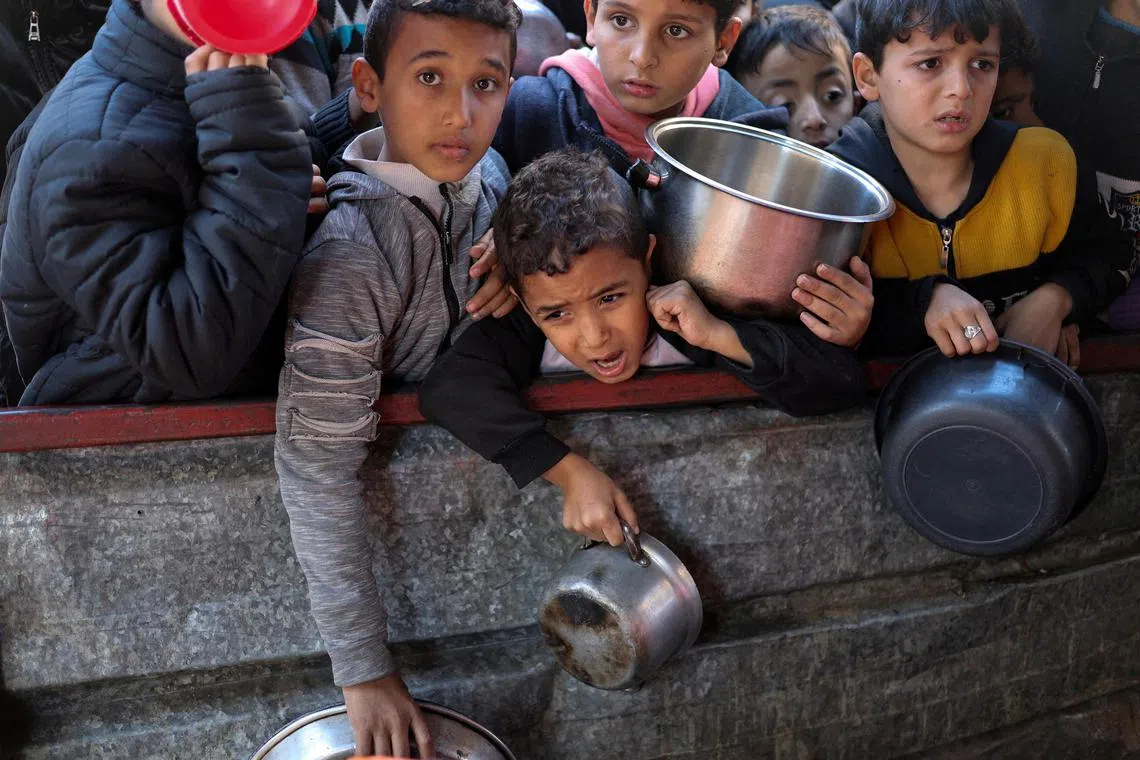Israel hits back at UN report warning of Gaza famine
Sign up now: Get ST's newsletters delivered to your inbox

Palestinian children waiting to receive food cooked by a charity kitchen in Rafah, in the southern Gaza Strip, on Feb 5, 2024.
PHOTO: REUTERS
JERUSALEM – Israel hit back on March 29 against a United Nations-backed report that warned of imminent famine in Gaza, alleging the assessment contained inaccuracies and questionable sources.
The analysis released last week
The Integrated Food Security Phase Classification (IPC) partnership estimated that 1.1 million people – half the population, according to UN – are facing dire conditions.
UN humanitarian chief Martin Griffiths called for Israel to allow unfettered access for aid to the besieged Palestinian territory.
The Coordinator of Government Activities in the Territories (Cogat), the Israeli Defence Ministry body responsible for Palestinian civil affairs, said Israel “recognises the unfortunate impacts of the war on the civilian population of Gaza”.
But it added that Israel does not operate food distribution in Gaza and accused UN agencies of being unable to handle the quantity of aid arriving daily.
“At any given moment, there are hundreds of trucks held up at the Gazan side of the Kerem Shalom crossing after having completely been processed by the authorities in Israel,” Cogat said.
Israel has tense relations with some UN agencies, particularly the UN Relief and Works Agency for Palestine Refugees in the Near East, which reported last week that Israel has barred it from making aid distributions in northern Gaza.
Cogat also questioned the accuracy of a line in the report that says a daily average of 500 lorries – 150 of them food lorries – arrived in Gaza before the war, compared with 60 food lorries a day since.
“Pre-war, only an average of 70 daily trucks carried food,” Cogat countered, without providing a source.
Israel said it has placed no limit on the volume of humanitarian aid that can enter Gaza.
Israel also criticised the IPC assessment’s citation of casualty figures from the Health Ministry in Hamas-run Gaza, saying the militants have a “strategic interest” in offering misleading information.
The death tolls provided by Gaza’s Health Ministry are widely cited by media, humanitarian groups and the UN – and some experts have said that they are quite possibly an undercount, not an exaggeration.
Israel’s military has waged a retaliatory offensive against militant group Hamas that has killed 32,705 people in Gaza, most of them women and children, according to the ministry.
Hamas’ unprecedented Oct 7 attack,
The Palestinian militants also seized about 250 Israeli and foreign hostages.
Dozens were released during a week-long truce in November and Israel believes about 130 remain in Gaza, including 33 who are presumed dead.
Witnesses said on March 30 that Gaza was shaken by heavy clashes and explosions, with the Red Crescent reporting several people killed during the latest chaotic aid distribution in the territory’s north.
The Hamas press office reported more than 50 Israeli air strikes over the past day, with “civilian houses” targeted across the coastal territory, as well as tank fire in the Gaza City area and southern Gaza.
Israel’s military on March 30 said it had struck dozens of targets, including militants and their compounds in central and northern Gaza.
Israeli Prime Minister Benjamin Netanyahu on March 29 gave the go-ahead for a new round of talks on a Gaza ceasefire, with his office saying they will take place in Doha and Cairo “in the coming days... with guidelines for moving forward in the negotiations”.
Those talks appeared deadlocked in recent days despite a major push by the United States and fellow mediators Egypt and Qatar to secure a truce in time for the Muslim fasting month of Ramadan, now more than halfway through.
As Washington publicly expresses concerns about an anticipated Israeli military offensive in Rafah, a city in southern Gaza that has been bombed repeatedly ahead of the threatened Israeli ground operation, two sources said the US has in recent days authorised the transfer of billions of dollars worth of bombs and fighter jets to Israel.
The new arms packages include more than 1,800 Mark 84 bombs, weighing 907kg each, and 500 Mark 82 bombs, weighing 227kg, said the sources, who confirmed a report in The Washington Post.
Washington gives US$3.8 billion (S$5.1 billion) in annual military assistance to Israel, its long-time ally.
The US has been rushing air defences and munitions to Israel, but some Democrats and Arab American groups have criticised the Biden administration’s steadfast support of Israel, which they say provides it with a sense of impunity.
Mr Biden on March 29 acknowledged “the pain being felt” by many Arab Americans over the war in Gaza and over US support for Israel and its military offensive.
Still, he has vowed continued support for Israel despite an increasingly public rift with Mr Netanyahu.
The White House declined comment on the weapons transfers.
The Israeli embassy in Washington did not immediately respond to a request for comment.
The decision on weapons follows a visit to Washington by Israeli Defence Minister Yoav Gallant this week, during which he discussed Israel’s weapons needs with US officials. AFP, REUTERS


